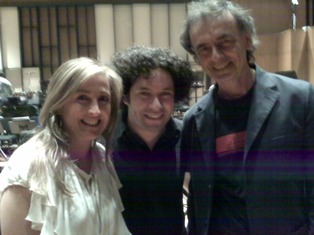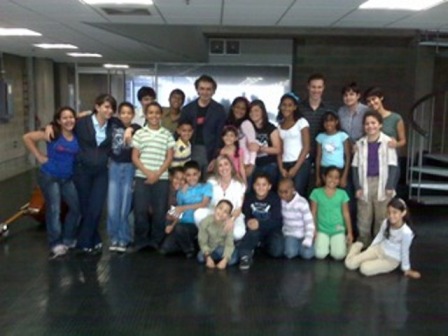Click here for Part Five
Caracas, 13 de Abril, 2010
Having been so blown away by the rehearsal of the Simón Bolívar orchestra the previous Friday (see Part Three), and totally involved with planning these Young Composer classes, one might excuse me if attending the concert of the Mahler 7th Symphony this Tuesday evening would be somewhat of a let-down.
But no. Even though Richard Mannoia was totally ill and could not attend, even though I myself was exhausted, this turned out to be an evening to remember for the rest of my life.
First of all, you have to appreciate this: Attending one of these concerts at the Teresa Carreño Theater puts one in the middle of an unmistakable atmosphere of celebration, liberation, and national pride. As I’d said, the theater was recently liberated from its political-only bondage. Before even arriving at the gate, we are besieged with vendors hawking photographs, recordings, memorabilia of the Simón Bolívar orchestra, of El Sistema, and of course of Gustavo Dudamel, a national hero. Sound familiar? Hellooo: Like a rock concert, a Yankees or Red Sox game, an event which excites public passion.
The atmosphere tingles with expectation. Dani Bedoni, our incredible friend (words fail) apologizes that the seats are not the best. (They are the best, but never mind that.) The concert begins a bit late, and the audience starts up several times in impatient applause. It appears to me like an expression of eagerness, rather than annoyance, since, well, lots of things start late around here.
Finally, the orchestra streams onstage, all 100 of them, as actors in a great drama, beaming, heads lifted in pride. Applause greets them, and then the concertmaster, Alejandro Carreño (Yes, a descendant of Teresa Carreño, one of Venezuela’s first great composers, but more of that later). At last, Gustavo Dudamel, to thunderous applause.
Now, I know this symphony well, having performed it with some of the great conductors over the years. Words are going to fail badly here, but suffice it to say that my overall sense of the core of it is of darkness, forcefully moving toward light and victory, but of many quick and inexplicable jolts of mood, heavily fraught with the history of the German struggle and Weltanschauung. How is it possible, then that this conductor, not yet 30, with a junior orchestra of kids, really, many of whom probably know little of the course of German culture or philosophy, literally bring Mahler to life right in front of my eyes, ears and soul? How is this possible?
I almost cannot sit in my seat. I am in tears the entire performance. I’m fleetingly aware that I’m glad no one is sitting directly behind me, I don’t want to annoy anyone. But I am in a different world. My world, Mahler’s world. This is why I became a musician. The technical accuracy, the joy, the grasp of the mood swings by Gustavo – never showy or in any excess, yet exquisitely planned, convincing utterly. The cellos straining mightily to express to us the depth of their sorrow and passion, The tenor tuba, alone in its eloquent orations, heroic, tragic, thougthful, youthful.
OK, the words do fail. But the music does not. It is conveyed to these people in its eagerness, its virtuosity, its honesty. The applause is long and thunderous. These are heroes, giving us pride, beyond national pride, the pride of having done something human and good.
On a more worldly, professional level, one may well ask how an orchestra such as one of the top El Sistema orchestras compares to the traditionally great orchestras of the world. An unfair question, really, but one that will be asked in any case. First of all, I am anything but an objective observer. The experience of great art and music is my life. I would never take anything away from the sheen and polish of the great symphony orchestras; the magnificent soloists and section leaders, the lush sounds of masterful playing of all the members, the depth and sweep of the repertoire: all this is the achievement of centuries. The greatest orchestras are incomparable–I know because I’ve played in one of them most of my adult life.
But nothing in this life stays the same. Here in Venezuela is being born a new spirit in the symphony orchestra. And well would we do to celebrate it. Members of the Berlin Philharmonic are streaming down here constantly to teach, yes, but also to learn. The same for the other great orchestras of the world–and now the New York Philharmonic. As we leave, Sir Simon Rattle arrives. Then Claudio Abbado. Yo-Yo Ma. Wynton Marsalis. The list is dazzling, exhaustive. Deborah Borda of the Los Angeles Philharmonic sensed the energy here early on, and famously woo’ed Gustavo up to the LA Philharmonic. I say: More power. We all benefit from innovation. Likewise, the great innovators of Music Education (now in capital letters!) from Eric Booth, Mark Churchill and Anne Fitzgibbon to Tom Cabaniss, Sarah Johnson, Jennifer Kessler, Ted Wiprud and so many others from the U.S. and Europe have either come down here multiple times, or sent representatives. Mark Churchill’s Abreu Fellows are already becoming legendary.
14 de Abril
Speaking of innovation: Back to our Young Composers classes! We are making headway today: music is proliferating among our pioneering students. Both Dani and Diana are here, and along with Richard, Rosa and Pedro, we are circulating among our composers, working with voice, instruments, keyboards. It also occurs to me that we should be recording their drafts. Gabriél and David are clearly advanced in their thinking, yet are struggling with notation. Are they really hearing what they are writing? Apparently so, but are writing in a linear way, instead of vertically, as a score. Am i getting my point across? With two days left to go and over two dozen children to care for, this is daunting. I’d asked for a young professional student of mine, Micah Brashear, to join us, but it was decided that the staff was sufficient as it was. Now I wonder. There are so many things that simply cannot be predicted, here on all sides, that it is really amazing we’ve gotten this far. Everyone wants this to succeed, but what exactly is the measure of “success?”
The next few days will tell…
–Jon Deak
Click here for Part Seven
***************************************************************************************************************
Jon Deak, born in the sand dunes of Indiana of East European parents, is a Composer, Contrabassist, and Educational pioneer. Educated at Oberlin College, the Julliard School, the Conservatorio di Santa Cecilia (Rome) and the University of Illinois, he joined the New York Philharmonic and served as its Associate Principal Bassist for many years, while continuing his professional composing, and studying with Pierre Boulez and Leonard Bernstein. During this time he also introduced ground-breaking performance techniques for the Contrabass, and in his orchestral writing, working with major orchestras across the country.
From 1994 – 97 he served as Composer In Residence (sponsored by Meet the Composer) with the Colorado Symphony under Marin Alsop, which is where he initiated the public school program now called The Very Young Composers (VYC).
With support from the New York Philharmonic and others, the VYC has grown steadily, winning a national award for excellence in 2004. The program has been introduced in Shanghai, Tokyo, and now in Venezuela, besides serving hundreds of children in eleven New York area Public Schools and such places as New England and Eagle County, Colorado. The New York Philharmonic has premiered 42 works for children, fully orchestrated by the children themselves, mostly under the ages of 13, as well as hundreds of chamber works in the public schools and libraries.
***************************************************************************************************************

Daniela Bedoni, Guztavo Dudamel, and Jon Deak

Daniela Bedoni, Richard Mannoia, and Jon Deak with children from El Sistema
 blog | AJBlog Central | Contact me | Advertise | Follow me:
blog | AJBlog Central | Contact me | Advertise | Follow me: 

